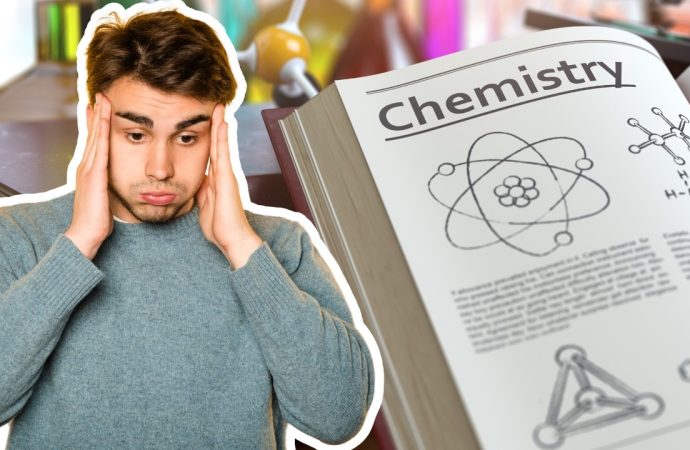Introduction Chemistry is often perceived as one of the most challenging subjects in high school and college. Balancing abstract theories, mathematical equations, and complex reactions requires more than just rote memorization. Many students find themselves struggling to keep up in traditional classroom settings where teaching methods may not align with their learning styles. This is
Introduction
Chemistry is often perceived as one of the most challenging subjects in high school and college. Balancing abstract theories, mathematical equations, and complex reactions requires more than just rote memorization. Many students find themselves struggling to keep up in traditional classroom settings where teaching methods may not align with their learning styles. This is where personalized study comes in—a tailored approach that adapts to an individual’s learning pace, preferences, and existing knowledge base.
With advancements in technology and educational resources, students now have more tools than ever to customize their learning experiences. One of the most transformative shifts has been the rise of online chemistry tutoring, which offers flexible and individualized support designed to meet each student’s unique needs. But why does personalization matter so much when it comes to mastering chemistry?
Key Points
- Personalized study aligns with individual learning styles, making complex concepts more digestible.
- Students experience better engagement and motivation when learning is tailored.
- Adaptive tutoring helps in identifying and addressing knowledge gaps efficiently.
- Technology-enabled personalized learning offers flexibility and convenience.
- Improved academic outcomes, including higher grades and deeper conceptual understanding, result from personalized strategies.
Understanding the Challenges of Learning Chemistry
Before diving into how personalization helps, it’s important to understand why students struggle with chemistry in the first place. Chemistry combines theoretical understanding with practical application, often requiring:
- Abstract Thinking: Students must visualize atoms, molecules, and reactions that cannot be seen with the naked eye.
- Mathematical Proficiency: Concepts such as molar calculations, balancing equations, and thermodynamics involve math skills.
- Multi-Step Problem Solving: Chemistry problems often involve several steps and areas of knowledge.
- Cumulative Knowledge: New topics frequently build on previous ones, making early comprehension critical.
When these challenges are met with one-size-fits-all teaching methods, many students fall behind. Personalized study seeks to change that by aligning teaching with the learner.
The Core Principles of Personalized Study
1. Tailored Learning Paths
Every student brings a different set of strengths and weaknesses to the table. Personalized study begins with assessing where a student stands in terms of understanding, and then builds a learning path that focuses on their specific needs. This might mean revisiting fundamental concepts for one student, while another may benefit more from advanced problem sets.
2. Flexible Pacing
Traditional classrooms often move at a predetermined pace, leaving students either bored or overwhelmed. Personalized learning allows students to spend more time on topics they find difficult, and move quickly through those they master easily. This reduces frustration and boosts confidence.
3. Varied Instructional Methods
Some students are visual learners, others prefer auditory explanations or hands-on activities. A personalized approach incorporates diverse instructional modes to match these preferences. Using videos, simulations, practice quizzes, or even real-life analogies can make abstract chemistry concepts more relatable.
How Online Chemistry Tutoring Personalizes Learning
With platforms providing online chemistry tutoring, students gain access to customized instruction that adapts to their evolving needs. These services often include one-on-one sessions, interactive problem-solving, and real-time feedback—all key components for effective learning.
1. Interactive One-on-One Sessions
Tutors can assess a student’s understanding in real-time and tweak the lesson accordingly. These sessions foster a safe environment for asking questions and exploring challenging concepts without fear of judgment.
2. Diagnostic Assessments
Many online tutoring services begin with a diagnostic test to determine a student’s current level. This data helps tutors target specific problem areas, optimizing the time spent on learning.
3. Progress Tracking and Feedback
Personalized tutoring platforms often include progress tracking tools. These allow both students and parents to see measurable improvements over time, providing motivation and accountability.
Benefits of Personalized Study in Chemistry

Image by: Yandex.com
1. Improved Academic Performance
Perhaps the most tangible benefit is better grades. Personalized approaches lead to deeper understanding, which translates into higher test scores and improved classroom performance.
2. Enhanced Retention
When students learn in a way that resonates with them, they are more likely to retain the information. Personalized study often incorporates repetition and reinforcement strategies tailored to the individual.
3. Reduced Anxiety and Stress
Struggling in chemistry can be a significant source of stress for students. Personalized help builds confidence by creating a supportive and structured environment, reducing fear of failure.
4. Encouragement of Independent Learning
Personalized learning doesn’t just help students understand chemistry—it teaches them how to learn. By recognizing their own preferences and strategies, students become more self-driven learners, a skill that benefits them across all subjects.
Personalization Techniques in Chemistry Education
1. Use of Learning Management Systems (LMS)
LMS platforms often include features that support personalized study, such as adaptive quizzes, content recommendations, and detailed performance analytics. These tools help identify learning trends and tailor future instruction.
2. Gamification and Interactive Tools
Gamified elements like quizzes, badges, and progress bars can make learning more engaging. Interactive simulations allow students to visualize chemical reactions and processes that are difficult to imagine otherwise.
3. Flipped Classrooms
In a flipped model, students review material at home and use class time for hands-on problem-solving. This aligns well with personalized study by allowing students to learn at their own pace before applying what they’ve learned in a collaborative setting.
4. Data-Driven Instruction
Using analytics, educators and tutors can make informed decisions about what each student needs. This minimizes guesswork and maximizes instructional effectiveness.
Real-Life Success Stories
Numerous studies and anecdotal reports highlight the effectiveness of personalized study. For example, a 2020 study by the U.S. Department of Education found that students using personalized learning models in STEM subjects, including chemistry, scored significantly higher than their peers in traditional settings.
Consider the case of Sarah, a high school junior from Texas who struggled with organic chemistry. After months of low grades, she opted for online chemistry tutoring. Within three months of personalized lessons and targeted practice, her test scores improved from 65% to over 90%. Her confidence soared, and she even started helping classmates with difficult concepts.
How Parents and Educators Can Support Personalized Learning
1. Encourage Autonomy
Allow students to take ownership of their learning by setting goals and tracking their own progress. This builds intrinsic motivation.
2. Provide Access to Resources
Ensure students have access to quality personalized learning tools—this may include tutoring platforms, educational apps, and supportive classroom environments.
3. Establish a Routine
Personalized learning is most effective when it’s consistent. Help students build a study schedule that incorporates regular review and practice.
4. Communicate with Tutors and Teachers
Open communication helps ensure that the personalized approach is aligned across all fronts—home, school, and tutoring sessions.
Conclusion
Learning chemistry doesn’t have to be an uphill battle. With the right strategies and resources, students can transform their academic journey. Personalized study offers a way out of the frustration that often accompanies traditional learning models. By adapting instruction to fit the learner, personalized approaches not only improve grades but also foster a deeper appreciation for the subject itself.
Whether through classroom adaptations or online chemistry tutoring, the key lies in understanding each student’s unique needs. As educational tools continue to evolve, the emphasis on personalization will likely become even more central to student success—not just in chemistry, but across all disciplines.
Frequently Asked Questions (FAQ)
Q1. How is personalized study different from traditional learning?
Traditional learning often follows a standardized curriculum and pacing, while personalized study adapts to an individual student’s needs, preferences, and learning style. This can include custom assignments, flexible pacing, and varied instructional approaches.
Q2. Is personalized learning suitable for all chemistry students?
Yes. Whether a student is struggling to catch up or aiming for advanced placement, personalized learning can be adapted to meet varying academic levels and goals.
Q3. How does online chemistry tutoring support personalized learning?
Online tutoring provides one-on-one sessions tailored to a student’s current knowledge and goals. Tutors use real-time feedback, diagnostic assessments, and customized lesson plans to focus on areas that need improvement.
Q4. Are there any downsides to personalized study?
While generally beneficial, personalized study requires commitment and may initially involve more time and effort to set up effective strategies. Additionally, not all platforms or tutors offer the same quality of personalization.
Q5. What tools or platforms are recommended for personalized chemistry learning?
Quality tutoring platforms, learning management systems, and educational apps with adaptive learning features are great tools. Look for platforms that offer diagnostic assessments, real-time feedback, and a variety of content formats.
Q6. Can personalized study improve performance in standardized chemistry tests?
Absolutely. By targeting specific weak areas and reinforcing core concepts, personalized study equips students with the knowledge and confidence needed to perform well on standardized exams like the SAT Subject Test in Chemistry or AP Chemistry.
















